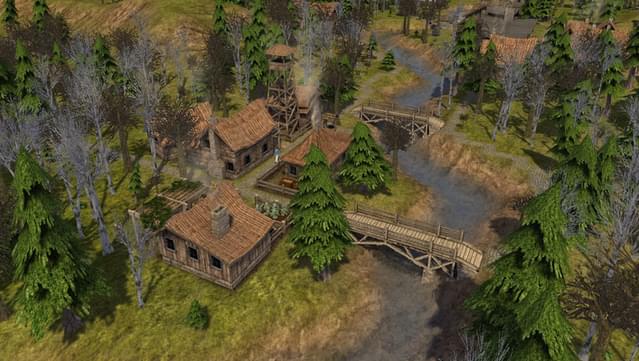

The soundscape, however, is only average, and after a few hours of playing Banished, you can easily do without the music. Compared to this beauty, the few small bugs aren't so important. Added to that are the four seasons and your fields, where you can watch the rhythms of the countryside come and go. Busy workers run across the screen, wild game crosses the river, and fishermen cast their rods.

Attractive graphics, unnecessary soundīanished is beautiful to look at.

Many a time you'll end up fighting with small buttons in lots of windows or can't easily find the individual buildings in the forest, let alone tell them apart. For many functions there are shortcuts on offer, which will avoid you having to click through several windows. The camera turns and pivots using the keyboard. Many players find it unusual that Banished isn't just controlled with the mouse. After several winters without food, he dies. The good citizen Arthurman got lost chopping wood and cannot find his way back. In contrast, you do stumble upon bugs now and again. The acceleration function helps guard against boredom. A shorter route increases the productivity of the working group. Other tools such as the path-tool are innovative and exciting: in order to improve the processes, then check the routes taken by the workers. If there's no fountain, then the entire city burns down as demolishing surrounding buildings takes too long. Making construction errors or errors in deciding priorities, are punished mercilessly by Banished: Whoever fails to get the harvest in ends up looking in vain for peaches in the snow. In addition to some confusion over the game mechanics, Banished doesn't hold players' hands. In addition, the tutorials don't explain all of the correlations: Should warehouses be centralized or decentralized? Why do workers go around the mountain, when you can't actually build a road there? And in what order do the workers carry out tasks? Players have to search through Banished's detailed written help themselves. Up until the construction of the city hall, the player only knows the quantity of his resources and has to look in vain for an overview of the production processes and the effectiveness of buildings. In comparison to other building simulation games, Banished does indeed use simpler economic cycles, but it leaves many relationships unclear. In addition, Banished doesn't use money, which makes resources extra important. You can build all buildings right from the beginning, and your population ages and dies. In addition, Banished breaks with some of the established building strategy rules: Seasons, for example, make the economy asymmetric – fruit trees are harvested once a year. In addition to the visual effects, the selection also determines the difficulty level for the player. The only thing you can mold from the start is the map: what the dominant climate is in the world, whether the landscape should be hilly or flat, and how many resources the player has at the start. The game doesn't tell a story and there are no computer opponents to play against, or multiplayer or campaign options. When it comes to looking after the population, there are no game objectives in Banished. In addition to the new tasks, maintaining a balance between the basic raw materials and the growing population remains a challenge: food, firewood, living rooms, clothing, and medicine are absolute necessities in Banished. A trading post introduces cattle breeding and agricultural seeds into the city while the city hall has all sorts of useful information about production and life expectancy. If the Banished residents are looked after, then you begin to see a younger generation – children are born, go to school and eventually become valuable workers, replacing those who die.Ī larger population needs public buildings such as churches or cemeteries, but it also creates new opportunities. In time, simple economic cycles can be established: A hunter kills wild game, the leather is processed by a furrier into clothes, which keeps the hard working population warm. Firstly, the prudent city builder must erect a few houses and ensure there is sufficient firewood and food.


 0 kommentar(er)
0 kommentar(er)
